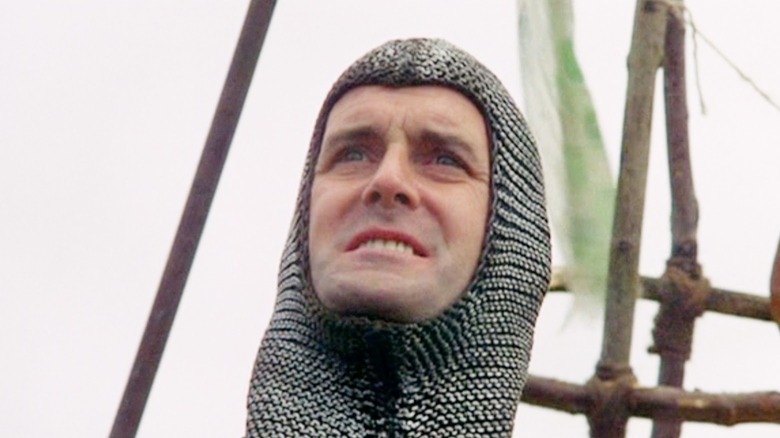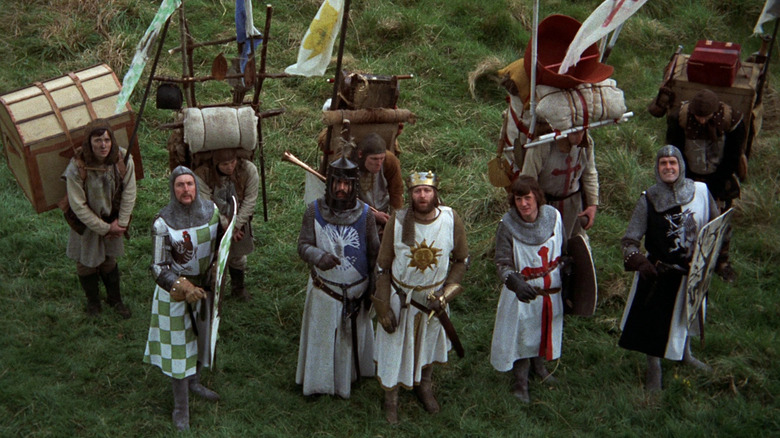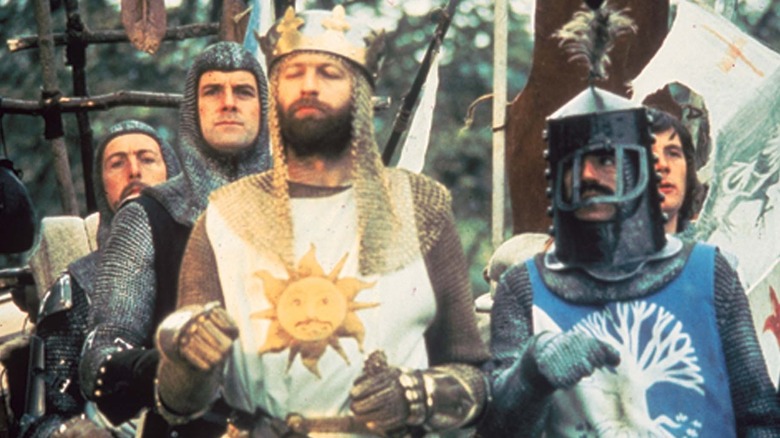John Cleese Has 'No Idea' Why Monty Python Has Had Such A Lasting Impact
Of all genres, comedy runs the risk of aging the fastest. In some cases, this can be due to the use of offensive jokes in old works that fly in the face of modern audiences' sensibilities. In others, it's simply because joke structures that were innovative and surprising to audiences at one point have become trite and overused. Because of comedy's inherently short shelf life, it's one of the most difficult genres to create a timeless classic within. That's why the few movies that have seemingly accomplished this, movies like "Airplane!" and "Blazing Saddles," are such impressive works of art, as they manage to hold up even against the ravages of time.
In some cases, even the creators of these movies are surprised by how much staying power they have. This is the case for John Cleese, one of the co-founders of the legendary Monty Python sketch group. While Monty Python is responsible for many comedies that I believe hold up very well, by far their most persistently popular work is "Monty Python and the Holy Grail," their parody of the medieval stories of King Arthur and the Knights of the Round Table.
The film has been a massive success since its release, with impressive box office earnings, especially for a British film released in the United States. To this day, the film finds itself ranked highly by multiple outlets, with ABC declaring it the second-best comedy film ever in 2011, and Empire in 2016 ranking it as the 18th-best British film of all time. Despite all of the film's success, Cleese is still not sure why it's remembered so fondly. When asked by the Harvard Business Review what he viewed the movie's lasting impact as, he simply replied, "I have no idea. I think you'll have to ask people who watch it."
Monty Python is for the kids
Before the Monty Python troupe made movies, they were best known for their BBC sketch series, "Monty Python's Flying Circus." The show, which is a cult classic in its own right, aired between 1969 and 1974. According to Terry Gilliam, another member of the group, it was frustrations with the limited television format that led to the making of "Monty Python and the Holy Grail," the group's first original feature film, in 1975.
Back then, it's hard to imagine any of the group were aware of the impact the film would go on to have, and according to the Harvard Business Review interview, John Cleese is still quite surprised:
"All I know is that, for reasons that none of us understand, it just seems to go on and on and on. In America, in particular, every new young generation seems to rediscover it, which is a mystery to us."
As an American who definitely went through a Monty Python phase in middle school, much to the chagrin of my teachers, I can personally attest to this phenomenon. To imagine a group of middle schoolers enjoying any other piece of art from so long ago would seem ridiculous, but "Monty Python and the Holy Grail" truly has a timelessness to it that few films can claim.
Accessibly absurdist
According to John Cleese in the Harvard Business Review piece, he believes it's Monty Python's absurdist qualities that lead to its continuing popularity amongst young people:
"I think it's because the Python attitude toward life is to suggest how absurd everything is, and when people are younger they often look around and think it's all a bit crazy. Humor is fundamentally a sense of perspective, and as I've grown older I've just gone back to the position I had when I was 15 or 16 when I thought most of what was going on was absolutely ridiculous. I've now re-reached that position at the age of 74."
This theory definitely checks out, as young people have a tendency to embrace absurdist humor, especially Gen Z in recent years. It makes sense that a movie that relies on almost dadaistic comedy maintains its appeal through the generations.
Regardless of how it has happened, "Monty Python and the Holy Grail" has become the gold standard of timeless comedy. It left a huge footprint in the landscape of film, with even Steven Spielberg flinching at the idea of making a movie too similar to the farcical classic. Comedy doesn't always age gracefully, but "Monty Python and the Holy Grail" has proven, much like the Old Man, that this comedy is "not quite dead yet!"


